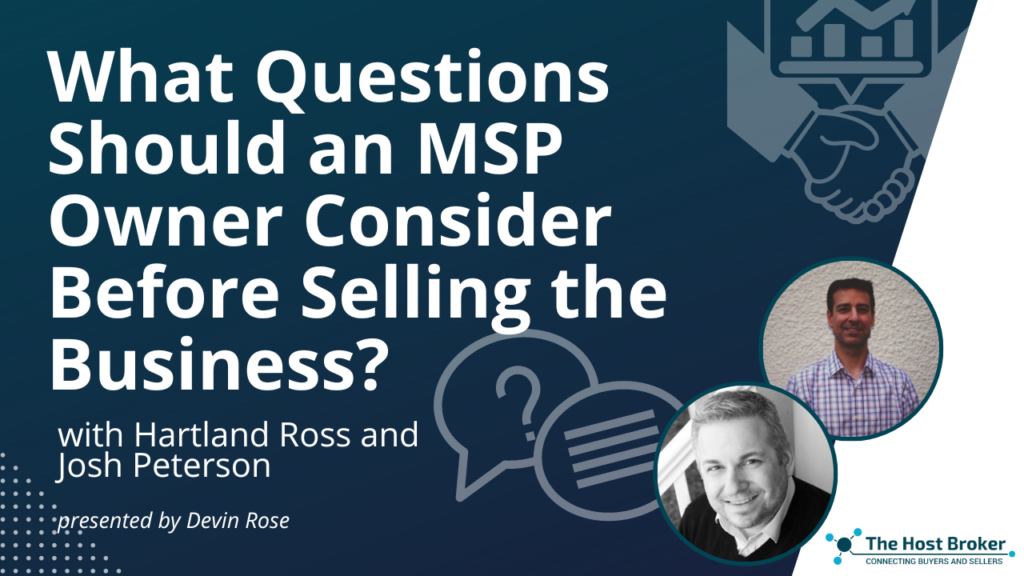
What questions should an MSP owner consider before selling their business? Find out in a webinar presented by The Host Broker and eBridge Marketing Solutions with special guest, Josh Peterson, the CEO of Bering McKinley and BMK Community.
The first question to consider is: what valuation does the owner need to achieve their goals? We emphasize the importance of considering this question early on and not waiting until the owner receives an offer or lists the business for sale. We also mention the personal and financial factors that should be taken into account when determining the valuation and the need to consult with a CPA to understand the tax implications of the transaction.
The second question is about the financial metrics that should be focused on to increase the valuation of a managed service provider (MSP) for sale. The valuation methods for an MSP are related to cash flow and net profit. Recurring revenue is another metric that can increase valuation. For smaller MSPs, attaching a cost of goods sold to each item of revenue and knowing where the profitability comes from is essential.
The third question is whether having a sales team in place can increase a company’s valuation. Having a sales team shows maturity and planning, and gives buyers confidence that the company has a system and process in place that will continue to produce growth. However, the assumption is that the sales team is productive and can justify their cost. Relying solely on word of mouth and referrals is not unique and will not increase valuation. Overall, having a sales team can help increase valuation, but it’s important to ensure that the team is effective and can produce results.
We also discuss whether an MSP’s clients are month-to-month, or have break-fixed contracts, that can be converted to longer contracts. There can be a healthy mix of recurring, project, and hourly revenue. But it is important to realize that buyers are looking for certainty in revenue streams and a customer base that will be with them long term. MSPs whose clients are on shorter term contracts may require a greater earn-out component.
The company culture and employee morale are also important factors for sellers to consider when preparing for an acquisition. Buyers will want to make sure that there is a cultural fit, and if the company is a bad place to work, it will be a red flag that will impact the valuation of the business. A good way to measure employee satisfaction is through the employee net promoter score (eNPS), which can help identify areas for improvement. A positive company culture will make employees more likely to stay, which will make the business more valuable to buyers. Remote work can also increase employee satisfaction, especially in areas with traffic congestion and long commutes, and can make the business more attractive to buyers from other regions.
The technology stack and infrastructure are also very crucial when selling an MSP. Sellers benefit when their CRM and PSA tools are similar to those of potential buyers to make integration easier. Having a better-built stack makes a business more attractive to buyers.
The next question is “What % revenue is associated with the top 5 clients?”, where we discuss the issue of customer concentration and its impact on a potential buyer’s perception of a business. For example, having a single client representing over 20% of a company’s revenue or the top five clients representing over 40% is seen as risky. However, sometimes there isn’t much an MSP can do about a situation where a large client grows substantially, in which case a buyer may wish to structure the deal with an earn-out or retention strategy to mitigate the risk.
Lastly, we discuss the cost of replacing the owner’s role in a business, which is an adjustment made to the profit and loss statement (P&L) when calculating adjusted EBITDA. The cost of replacing the owner depends on their role and geography, and it affects the valuation of the business.
If you have any questions, please don’t hesitate to contact us.